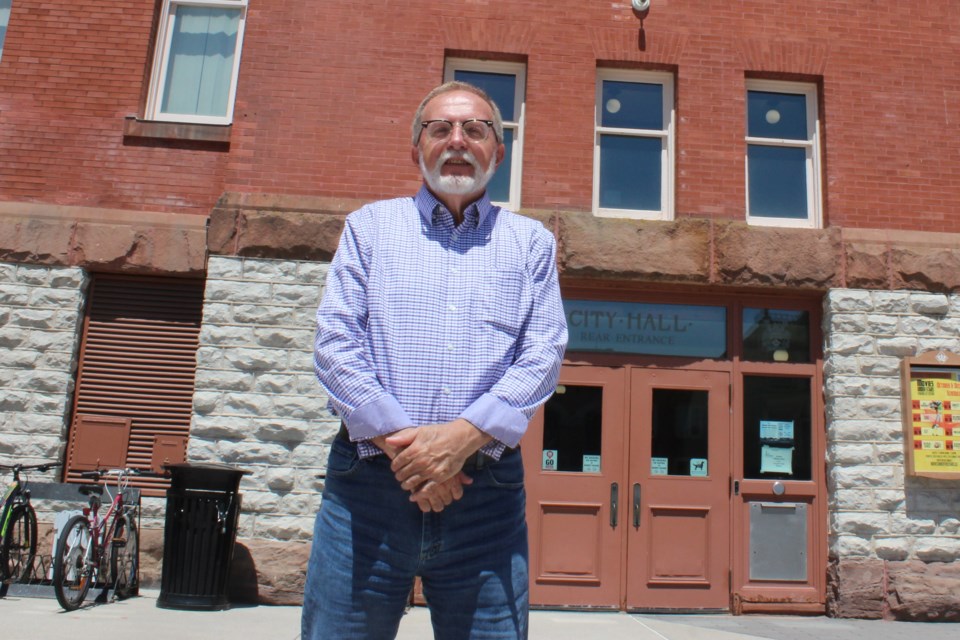When Alan Kasperski was campaigning for a local candidate with his dad, knocking on doors in southern Alberta, there were times when they were all but chased off the property if the home owner didn’t agree with the political leanings of their guests.
Though an eye-opening experience, the elder Kasperski, retired from the army, told his son it was a learning opportunity. His dad’s words after it happened were something he took to heart.
“It is important to say to people here is what you are, here is what is happening in your community, and have a conversation to ask, are you happy with that? Is this what you want? If it isn’t, how do you make things change?
Kasperski will ask those same questions on the door step as he seeks a spot on Stratford city council. Kasperski moved nine times in the first 19 years of his life, which is common for military families. He moved to Stratford two years ago.
With an abundance of behind-the-scenes political experience, Kasperski said he wants to put his knowledge to good work for the citizens of Stratford.
Kasperski worked on John Turner’s 1984 federal election campaign. Turner was the 17th prime minister of Canada, albeit for a short time, after Pierre Trudeau’s retirement. The Liberals were swept out of government. Kasperski went on to work for David Peterson’s Liberal campaign before he became premier of Ontario. He also worked on former Toronto mayor David Miller’s successful civic election campaign. Kasperski has worked as a deputy returning officer during elections for the last 34 years.
“I have been involved in campaigning, elections, but never a candidate, always behind the scenes.”
Kasperski said engagement, transparency and accountability are important to him and he has studied the current city council.
“People say we live in a representative democracy, it isn’t. You can count on two hands in the last 50 years who has been elected by a majority of the constituents. In Stratford, in the last five elections, not one city councillor or the mayor was elected by the majority of people in Stratford.”
“Half of the people in Stratford don’t vote. If you get half of the people who vote, it means 75 per cent of the people in Stratford didn’t vote for you. So how representative is that?”
To change that, and spur engagement, Kasperski said municipal politics needs to be more participatory and council needs to find ways to fight through the apathy and disinterest from voters.
Kasperski used the example of a survey the City of Stratford offered to citizens that focused on the budget process. 96 people responded, he said. This past year, it dropped from 96 to 24.
“On the biggest decisions that city council makes, 24 people responded. There needs to be more engagement with people. It is typical of city councils to do the minimum.”
Stratford city councillors don’t have offices at city hall, he said, so he suggested getting out to each of five parts of the city once per month, whether in a school or some sort of venue for an opportunity to hear what is important.
“You need to have a dialogue that is more than ‘here is what we are going to do is that okay’?”
Kasperski said citizens could become involved in participatory budgeting, where council would allot one percent of the total budget to be split between five areas in Stratford and ask the public what they want it spent on. That would ensure different communities have some say in budgeting.
Kasperski would like to see more transparency from council. City council’s handling of a potential $400 million Xinyi Canada glass plant project that ultimately did not move forward is an example of that, he said. Opposition groups noted environmental concerns, a lack of democratic process and too many closed-door meetings. Xinyi indefinitely suspended plans to build the plant locally.
“If you are going support an aging population, the community has to get wealthier, you need to generate revenue. To bring a significant employer to Stratford is a good thing – but do you have employees, do you have housing?”
“I think what the mayor and council didn’t look at enough, is how people of Stratford would react to a heavy industry. The mayor, investStratford (the city’s economic development corporation), made a mistake, it was the wrong industry for this community, the wrong industry for a lot of communities.”
City council’s frequent use of in-camera meetings is not something Kasperski has seen before at the municipal level, nor is the fact that they schedule them, he said. Freedom of information, criminal or security matters should be in-camera, he said.
“Everything else is discretionary. If you want people to come and work with city hall, you need to open the doors.”
Ultimately, city council has to be accountable for their decisions, and better decisions will be made if council are properly engaged and transparent with the community, he said.
Kasperski said he will have more to present to the public on his platform in the coming weeks.



